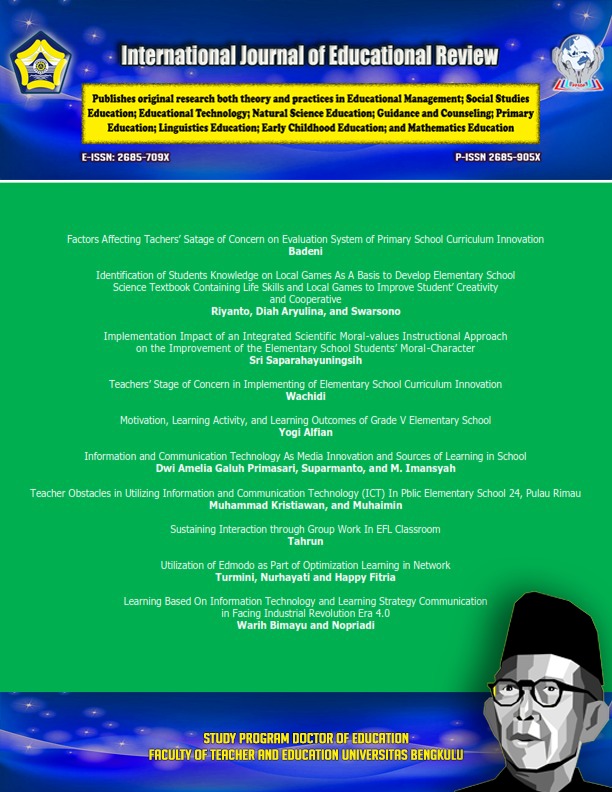Interactions Between Teachers and Students with Disabilities in Inclusive Public Primary Schools in Togo
DOI:
https://doi.org/10.33369/ijer.v5i1.30044Abstract
This research examines the interactions between teachers and children with disabilities (CWD) in Togo's public elementary schools. The field survey involved 20 schools through 27 inclusive classrooms observations and over a hundred interviews with teachers as well as children with disabilities (CWD) and some of their parents. The findings show that relations between teachers and CWD pupils are positive, given that the teachers are aware of the challenges of inclusive education, but they complain about the lack of training in differentiated pedagogy, which prevents them from playing their roles effectively in inclusive classes.
References
Barton, L. & Armstrong, F., (2007) Policy, Experience and Change: Cross Cultural Reflection on Inclusive Education, Dordrecht, Springer.
Baudoin, N. & Galand, B., (2021) « Les pratiques des enseignants ont-elles un effet sur le bien-être des élèves ? Une revue critique de la littérature », in, Revue française de pédagogie, Vol 2, No 211, pp. 117-146.
Blumer, H., (1969) Symbolic interactionism: Perspective and method, University of California Press.
Corbett, J. & Slee, R. (2000) “An international conversation on inclusive education”, in, Inclusive education: policy, contexts and comparative perspectives, Armstrong F., Armstrong D., Barton L. (Eds.), David Fulton, pp. 133-146.
DPEE/MEPSTA (2020) Tableau de bord de l’éducation au Togo. Les indicateurs 2019-2020. Direction de la Planification de l’Education et de l’Evaluation, Ministère des Enseignements Primaire, Secondaire Technique et de l’Alphabétisation, Togo.
Dufort, F. (1992) « La théorie des interactions symboliques et les enjeux de l’entrée massive des femmes en médecine », in, Recherches féministes, Vol 5, No 2, pp. 57–78.
Gardou, C. (2010) Le handicap au risque des cultures. Variations anthropologiques, Editions Erès.
Goffman, E. (1973) La mise en scène de la vie quotidienne. La présentation de soi, Les Éditions de minuit.
Hewstone, M. & Brown, R. (1986) Contact and conflict in intergroup encounters, Basil Blackwell.
Kincade, L., Cook, C., & Goerdt, A. (2020). “Meta-analysis and common practice elements of universal approaches to improving student-teacher relationships”, in, Review of Educational Research, Vol 90, No 5, pp. 710-748
Konu, A. & Rimpela, M. (2002) “Well-being in schools: A conceptual model”, in, Health Promotion International, Vol 17, No 1, pp. 79–87.
Mead, G. H., (1934), Mind, Self and Society, University of Chicago Press.
Moscovici, S. (2014). Psychologie sociale, Presses Universitaires Françaises (PUF), 3ème édition.
Prud’homme, L., Duchesne, H., Bonvin, P., & Vienneau R. (2016), L’inclusion scolaire : ses fondements, ses acteurs et ses pratiques, De Boeck Supérieur, 1ère Édition
PSE, 2014, Plan Sectoriel de l’Education, 2014-2025, Amélioration de l’accès, de l’équité et de la qualité de l’éducation au Togo.
PSE, 2020, Plan sectoriel de l’éducation de la République du Togo 2020-2030.
Stryker, S. (1981) “Symbolic interactionism: Themes and variations”, in, Social Psychology. Basic Books Inc., pp. 3-29.
UNICEF Togo, 2015, Rapport de l’UNICEF Togo pour l’Evaluation Périodique Universelle, Lomé.
Baudoin, N. & Galand, B., (2021) « Les pratiques des enseignants ont-elles un effet sur le bien-être des élèves ? Une revue critique de la littérature », in, Revue française de pédagogie, Vol 2, No 211, pp. 117-146.
Blumer, H., (1969) Symbolic interactionism: Perspective and method, University of California Press.
Corbett, J. & Slee, R. (2000) “An international conversation on inclusive education”, in, Inclusive education: policy, contexts and comparative perspectives, Armstrong F., Armstrong D., Barton L. (Eds.), David Fulton, pp. 133-146.
DPEE/MEPSTA (2020) Tableau de bord de l’éducation au Togo. Les indicateurs 2019-2020. Direction de la Planification de l’Education et de l’Evaluation, Ministère des Enseignements Primaire, Secondaire Technique et de l’Alphabétisation, Togo.
Dufort, F. (1992) « La théorie des interactions symboliques et les enjeux de l’entrée massive des femmes en médecine », in, Recherches féministes, Vol 5, No 2, pp. 57–78.
Gardou, C. (2010) Le handicap au risque des cultures. Variations anthropologiques, Editions Erès.
Goffman, E. (1973) La mise en scène de la vie quotidienne. La présentation de soi, Les Éditions de minuit.
Hewstone, M. & Brown, R. (1986) Contact and conflict in intergroup encounters, Basil Blackwell.
Kincade, L., Cook, C., & Goerdt, A. (2020). “Meta-analysis and common practice elements of universal approaches to improving student-teacher relationships”, in, Review of Educational Research, Vol 90, No 5, pp. 710-748
Konu, A. & Rimpela, M. (2002) “Well-being in schools: A conceptual model”, in, Health Promotion International, Vol 17, No 1, pp. 79–87.
Mead, G. H., (1934), Mind, Self and Society, University of Chicago Press.
Moscovici, S. (2014). Psychologie sociale, Presses Universitaires Françaises (PUF), 3ème édition.
Prud’homme, L., Duchesne, H., Bonvin, P., & Vienneau R. (2016), L’inclusion scolaire : ses fondements, ses acteurs et ses pratiques, De Boeck Supérieur, 1ère Édition
PSE, 2014, Plan Sectoriel de l’Education, 2014-2025, Amélioration de l’accès, de l’équité et de la qualité de l’éducation au Togo.
PSE, 2020, Plan sectoriel de l’éducation de la République du Togo 2020-2030.
Stryker, S. (1981) “Symbolic interactionism: Themes and variations”, in, Social Psychology. Basic Books Inc., pp. 3-29.
UNICEF Togo, 2015, Rapport de l’UNICEF Togo pour l’Evaluation Périodique Universelle, Lomé.
Downloads
Published
2023-04-18
How to Cite
Interactions Between Teachers and Students with Disabilities in Inclusive Public Primary Schools in Togo. (2023). International Journal of Educational Review, 5(1), 21–30. https://doi.org/10.33369/ijer.v5i1.30044
Issue
Section
Articles
License

This work is licensed under a Creative Commons Attribution-ShareAlike 4.0 International License.




